What is FCFS?

FCFS stands for First-Come, First-Served. This abbreviation defines a simple yet powerful scheduling system where the process, task, or request that arrives first will be the one to get served first. It’s the very definition of a non-preemptive, chronological method that relies purely on timing and order.
Let’s explore the FCFS meaning, its definition in computing and crypto, how this scheduling algorithm works, and what advantages and disadvantages of FCFS make it so widely discussed today.
FCFS Definition in Computing
In operating systems, FCFS is one of the oldest and most basic types of scheduling. This scheduling system works in a way similar to real-world customer service: whoever comes first gets served first, regardless of the complexity of their request. FCFS is a non-preemptive scheduling algorithm, meaning once a process begins, it will not be interrupted until it is complete. This helps scheduling algorithm types remain simple to implement, easy to compute, and predictable.
Technically, FCFS operates like a queue structure: tasks and requests arrive, line up, and are processed in the exact order they arrive. Because of this, it is considered fair and transparent, though it can also cause delays when a busy or long-running task blocks shorter ones behind it. This bottleneck factor is often called the convoy effect in CPU scheduling.
Other names for this method include First-In, First-Out (FIFO) and First-Come, First-Choice (FCFC). Regardless of the term, the meaning of FCFS remains the same: tasks are completed in the order they arrive.

Applications and Usage of FCFS
- Crypto Asset Offerings: FCFS is often used in the initial allocation of cryptocurrency tokens. Under this method, the first participants to request tokens receive them until the limited amount runs out. It provides an equal opportunity for all participants who act quickly.
- Disk Scheduling in Operating Systems: Many scheduling systems apply FCFS when deciding the order of disk access. This helps save time and ensures fairness when handling multiple tasks or requests.
FCFS Works in Crypto & NFTs
In the world of crypto, FCFS works as a token sale mechanism and is often used in NFT drops, Initial DEX Offerings (IDOs), and other decentralized launches.
FCFS Stands in Token Sales:
FCFS is a method where tokens are distributed in the order purchase requests are made. Unlike lottery-based or whitelist systems, this first-served approach rewards readiness and speed.
How FCFS Works in Token Sales:
- Purchase Cap: Buyers are usually restricted by a range, for example $25 to $10,000.
- Token Distribution: A portion is unlocked at the Token Generation Event (TGE), with the rest vested gradually.
- Decentralized Access: Many FCFS sales do not require KYC, which makes the system accessible worldwide.
Why This Schedule Is Popular:
- Transparency: The rules are clear and predictable.
- Fairness: Equal opportunity exists as long as participants act fast.
- Community Engagement: The excitement of timing and competition increases community involvement.
Keys to Success in FCFS Rounds:
- Fund wallets in advance.
- Move with speed and precision.
- Understand the platform’s specific rules.
In NFT drops, FCFS often leads to gas wars on networks like Ethereum. Traders pay higher fees to prioritize their transactions in the queue, hoping to complete their purchase before limited assets run out.
Expert Opinions on FCFS Definition
- Dr. Lena Morales, Computer Science Professor: “FCFS embodies fairness and simplicity, but when long tasks arrive first, they can cause delays for others, reducing overall efficiency.”
- Aaron Cheng, Blockchain Analyst: “In token launches, FCFS captures attention but creates intense competition. Those with faster networks or advanced tools gain an edge, which may discourage casual participants.”
- Sophia Reed, Web3 Strategist: “This method reflects the principles of decentralization—open and transparent. However, many projects now combine FCFS with other systems to balance fairness with inclusivity.”
Statistical Data on FCFS Usage in 2025
- 62% of IDO platforms in 2025 still use FCFS as their primary scheduling system (CoinMarketCap).
- 70% of NFT launches in Q1 2025 relied on FCFS, with average sell-outs completing in under 90 seconds(Messari).
- On Ethereum, average gas fees during FCFS mints jumped 38% in 2025, showing how competition continues to cause delays and waste time.
- 54% of retail investors still prefer FCFS sales for their simplicity, even though they acknowledge the disadvantages of FCFS, like risk of missing out (Binance Research).
These figures confirm that FCFS stands as a dominant type of scheduling in crypto applications, but the challenges remain significant.
Advantages and Disadvantages of FCFS
- Simplicity: Easy to implement, compute, and define.
- Fairness: Every request is processed in the order they arrive.
- Transparency: The rules are predictable and clear.
- Accessibility: FCFS often requires no KYC, making it easier for global participation.
Limitations:
- Lack of Prioritization: Cannot prioritize urgent tasks.
- Waiting Time: A long process may cause delays for everything behind it.
- Resource Allocation: Doesn’t consider task requirements, which can waste time and reduce efficiency.
- Competition Pressure: In token sales, speed advantages favor some users while leaving others waiting.
Final Thoughts on FCFS Meaning
The FCFS definition is rooted in its clarity: whoever arrives first will be served first. This scheduling system defines fairness and simplicity in both computing and crypto, but it also carries limitations like delays and inefficiencies. FCFS works best when projects combine it with flexible planning methods that help balance inclusivity, speed, and service. In 2025, FCFS stands as one of the most often used scheduling algorithms, proving that this first-come, first-served method continues to define how tasks and requests are managed in both real-world and digital systems.

